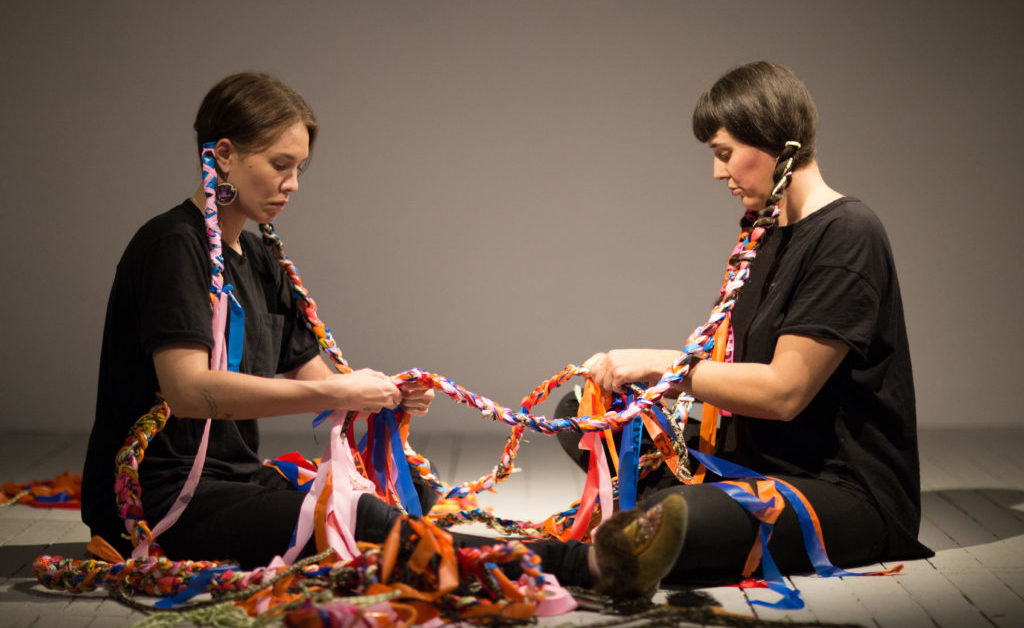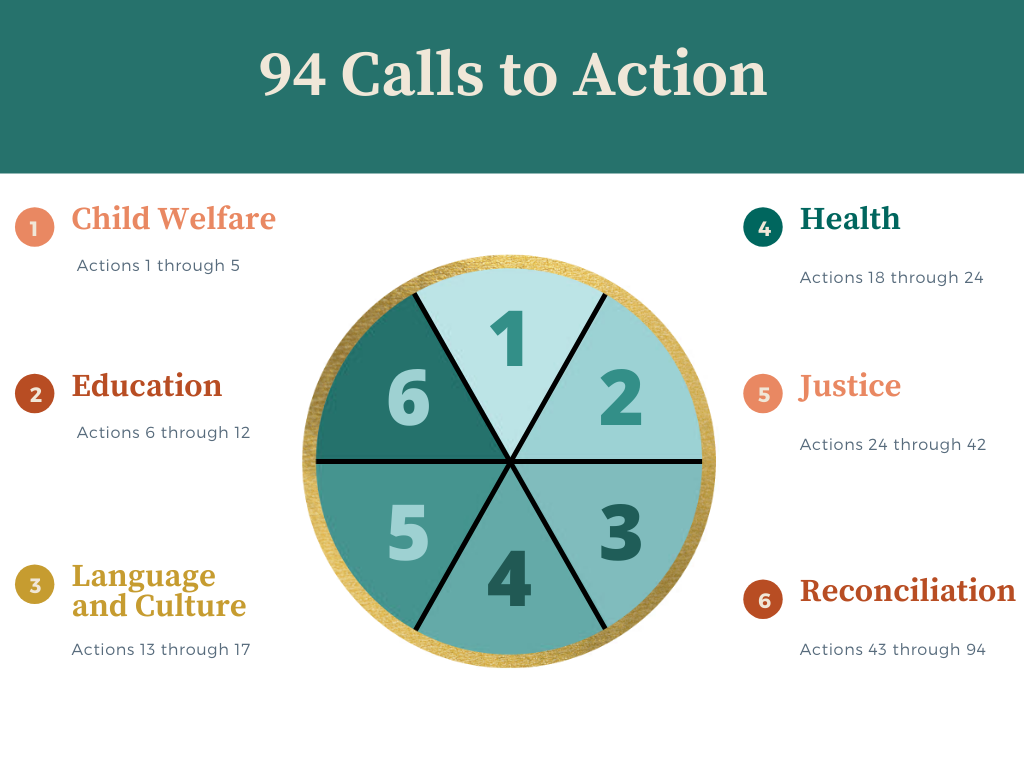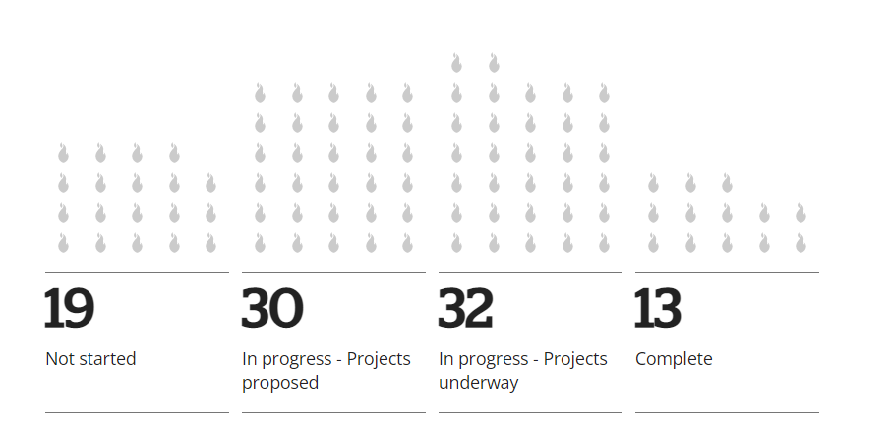
This is not a comprehensive list of all the ethical documents that exist to assist researchers, teachers, universities and individuals when working with Indigenous communities.
The guidelines discussed below are meant to give a broad, general understanding as to ethical topics necessary to be aware of prior to engaging Indigenous communities. Each community may have their own specific ethical guidelines, and it is our responsibility to seek them out to assure our actions are reciprocal, respectful, responsible and relevant.
Before looking at documents specifying how to engage in research, it is necessary to become familiar with two broader guiding reports:
Truth and Reconciliation 94 Calls to Action
This report is the result of one of the largest class-action lawsuits in Canada’s colonial History which was settled in 2007. The settlement agreement that was reached resulted in the creation of the Truth and Reconciliation Commission of Canada, which was comprised of a 10-member Indian Residential School Survivor Committee made up of survivors from across the country.
This commission lasted until December 18th, 2015 and in that time they gathered statements and documented truths from communities, residential school survivors, their families and anyone personally affected by residential school experiences. This report is the culmination of all of those statements, that calls on all levels of government as well as each citizen to work together to change policies and programs in a concerted effort to repair the harm caused by residential schools and move forward with reconciliation.
These 94 Calls to Action can be broken down into six categories: Child Welfare, Education, Language & Culture, Health, Justice, and Reconciliation.

These six categories work to address current and ongoing inequalities that Indigenous peoples face that are due to the long-lasting impacts of residential schools. A helpful article that breaks down the intention of each category and discusses ways to engage with them can be found here.
As of August 2022, only 13 of these 94 actions are considered complete.

Beyond 94 is a website put together by CBC that monitors the current progress happening on these calls to action, and is an invaluable tool to reference alongside the TRC’s 94 Calls to Action. It is important as a researcher, academic, teacher or general professional to understand what these calls to action are, as well as which ones are applicable to the area in which you work.
Action Item
United Nations Declaration on the Rights of Indigenous Peoples
Please watch this short video to gain an understanding as to what the United Nations Declaration on the Rights of Indigenous Peoples entails, how it was created and how it is being used. To read the document yourself, please click the link in the above image.
Research Specific Documents to Assure Ethical Interactions
Now that you have a broad understanding of the two documents above and how they have influenced global change regarding the ways in which Indigenous communities are engaged with, it’s important to look at specific documents that are necessary to be familiar with if you intend to do research, write about or with Indigenous peoples, or engage with Indigenous communities.
The Four R’s of Indigenous Research
The Four R’s of Indigenous Education and Research were developed by Kirkness & Barnhardt (1991) in direct consultation with Dr. Rod McCormick. They have also been adapted and expanded upon by Indigenous scholars such as Joanne Archibald (2008) in relation to storywork research methodologies.
These four principles are:
- Respect
- Responsibility
- Relevance
- Reciprocity
These four foundational values are integral to underpin each action taken in education and research. These traditional values must be centred by those wishing to work in research with Indigenous communities as they address the interconnected relationship among the self, family, community, wider world, and the environment.
The four R’s are a useful tool that facilitates the enactment of relational accountability, which is fundamental to building strong and genuine research partnerships with Indigenous communities.
By incorporating the principles of respect, responsibility, relevance and reciprocity into the foundation of a research project, you are assuring that this becomes a meaningful project not only to you but to the community you are working with. This foundation respects Indigenous peoples rights, while putting the communities needs first and maintaining a mutually respectful relationship.
To read the original article by Kirkness and Barnhardt, please click the link in the above image.
Tri-Council Policy Statement – Chapter 9: Research Involving the First Nations, Inuit and Métis Peoples of Canada
The Tri-Council Policy statement Ethical Conduct for Research Involving Humans is a foundational document for all individuals in academia who intend on doing research that is about, or involves human subjects.
Chapter 9 of this document focuses entirely on building a space across research which recognizes that First Nations, Inuit and Métis communities have unique histories, cultures and traditions, and that there needs to be a space for dialogue on common interests and points of difference between researchers and Indigenous communities engaged in the research.
This chapter specifically discusses the value of respect for human dignity and how the core principles of Respect for Persons, Concern for Welfare, and Justice (as articulated in Chapter 1) apply to research involving Indigenous peoples, cultures, and languages.
For a more detailed understanding of this document, please click on the link within the above image to learn more.
Action Item
Assembly of First Nations: First Nations Ethics Guide on Research and Aboriginal Traditional Knowledge
This resource was created in recognition that interest in Indigenous Knowledge is growing momentum, and there are challenges in determining best practices in the ethical use of this knowledge. This new paradigm shift in policy and inquiry requires a new ethical process to lay the foundation for working with Indigenous knowledge and with Indigenous communities.
This guideline aims to provide guidance for government agencies, organizations, researchers, First Nation governments and Indigenous communities.
The Core Principles of this document include:


You can find this document in full by clicking the link in the first image above.
The First Nations Principles of OCAP
This document establishes how First Nations Data and Information must be collected, protected, used or shared ethically within research. This tool supports First Nations data sovereignty by clearly outlining ethics regarding ownership, control, access, and possession.
OCAP® asserts that First Nations alone have control over data collection processes in their communities, and that they own and control how this information can be stored, interpreted, used, or shared. As a researcher, it is crucial to discuss with the community you are intending on working with BEFORE starting research how they want to store, use and potentially share the information that comes out of the work.
Please watch the following video to gain a deeper understanding as to what OCAP entails:
To read about the entirety of OCAP, please click the link within the first image to access their website.
Additional Ethical Documents
As mentioned at the beginning of this page, there are hundreds, if not thousands of separate ethical documents that exist to guide researchers and professionals to cultivate meaningful and reciprocal relationships with Indigenous peoples.
The most powerful thing that a researcher or professional can do is to take the time to read guidelines put out by the specific community they are intending on working alongside.
This should ideally always be done prior to contacting the community about the research, as each individual community and broader region will have their own specific protocols, and taking the time to determine how to do this work in the most respectful way lays the foundation for a truly reciprocal relationship.
To assist you in locating further documents, the below list has been put together with ethical documents our team has found personally helpful alongside the above discussed documents.
- Toolbox of Research Principles in an Aboriginal Context
- Protocols & Principles For Conducting Research in an Indigenous Context
- Negotiating Research Relationships with Inuit Communities
- First Nations in Quebec and Labrador’s Research Protocols
- CIHR Guidelines for Health Research Involving Aboriginal People (2007-2010)
- Kwayask itôtamowin: Indigenous Research Ethics
- Principles of Ethical Métis Research
- Social Sciences and Humanities Research Council – Indigenous Research





